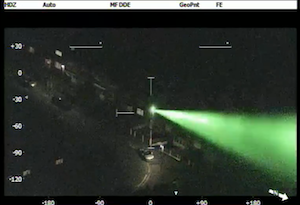Home
A comprehensive resource for safe and responsible laser use
Wales: Man claims rescue helicopter in the way of laser beam; search called off due to laser strike
On September 2 2020, a National Police Air Service helicopter with a crew of three was searching for a missing female teen at about 2:40 am when it was hit by five or six "bright green, sharp lights" lasting 5-10 seconds each. The pilot was momentarily blinded and was disoriented; another crew member was dazzled. The crew abandoned the search due to the pilot's loss of vision.
Ground officers went to a location pinpointed by the helicopter's thermal imaging camera. They smelled marijuana and found William Andrew David James Fellowes with a laser pen. He later told police he had been pointing at stars and the pilot got in his way. He said he did not know the sky light was a helicopter and thought it was a bird, a satellite or a hot air balloon.
Fellowes pleaded guilty to directing a laser beam towards a moving police helicopter in violation of the Laser Misuse (Vehicles) Act of 2018.
At trial the prosector said the aircraft was circling at 1,000 feet with its flying lights illuminated. He said the aircraft would have been obvious to ground observers.
The court was told that Fellowes had 30 previous offenses, including battery, possession of a knife, criminal damage, theft, and possession of cannabis with intent to supply.
Fellowes defense barrister said he "now realized how serious his actions had been and was remorseful for what he had done."
The judge found that Fellowes had not deliberately meant to harm the crew but his actions could have resulted in an accident, and did result in diverting the missing person search.
After sentencing, a South Wales Police superintendent said "National Police Air Service are a valuable partner who regularly assist us with our policing operations and searches. On this occasion they were performing a vital duty and assisting us to look for a vulnerable and suicidal young girl who had been reported missing…. The actions of this individual not only prevented them from carrying out these important duties but potentially could have had devastating effects in causing the helicopter to crash."
The head of safety at the National Police Air Service said during 2020 there had been an average of six laser attacks per month on its aircraft.
From Wales Online. The article includes photos and a video from the police helicopter.
Wales: Suspended sentence for 8-minute lasing of police helicopter
On September 25 2013, the helicopter was called to find a missing person. The pilot was hovering at 1,200 feet over a densely populated area of Greenfield when a green laser beam targeted the aircraft. Over an eight-minute period, the aircraft was hit about ten times by the beam. The majority hit the outside of the helicopter though a video recording showed the interior illuminated for a couple of seconds.

A frame from the helicopter video of the attack. The complete video can be seen here.
While the helicopter maneuvered to avoid the laser, the missing-person search was not abandoned. No emergency or evasive action was taken, and the captain was in full control throughout the incident. However, the attack distracted the crew, caused distress and wasted search time and resources, according to the prosecutor.
The three-man crew identified the source location and directed ground officers to the home of Kevin Mark Griffiths. He pretended to be asleep and later produced the laser from a bedroom. He told police he had purchased the laser while on vacation in Spain.
Griffiths said it was a “foolish, impulsive and reckless action,” aiming at what he knew was a police helicopter.
At trial Griffiths admitted a charge of recklessly endangering an aircraft or persons inside. He was given a five-month prison sentence suspended for 12 months, ordered to do 200 hours of unpaid work, and was fined £165 in costs.
From the Daily Post (with video) and Wales Online
Wales: Six month sentence for misuse of brand-new laser
McDonnell-Jones admitted aiming the laser outside but said he did not see the helicopter. The pen was found hidden under a baby’s mattress in the man’s home.
From the South Wales Argus
Wales: Three boys arrested after lasing helicopter
From BBC News North East Wales
Wales: 10 month jail sentence after laser hits plane
Hosseiny, originally from Afghanistan, was in the UK after seeking asylum in 2002. As a result of his laser assault and subsequent convictions, he was served with a deportation notice.
In the March 2009 incident, the airplane pilot said he had a "momentary loss of concentration" due to a "dazzling green light" as the plane was landing at Cardiff (Wales) airport. The trial judge stated that "The consequences of such an action could have been catastrophic. Fortunately there was no catastrophe and the aircraft landed safety."
More details from BBC News.